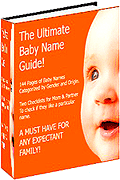Names and Trends - Uncommon Baby Names
Page 2
Dehydration initially causes children to become fretful, then lethargic, with sunken eyes and lax dry skin. Severe dehydration causes young children to become prostrate with deeply sunken eyes and cold mottled skin. Mild dehydration can be treated at home. Children should be given oral rehydration fluids, which can be bought at your local Pharmacy.
These are powders containing salts and sugar and which are dissolved in water. They allow prompt reversal of dehydration, and are more effective than water alone. No food should be given for 24 hours, after which time the normal diet can be gradually restarted. Moderate to severe dehydration requires hospitalization for intravenous fluid therapy. In tropical countries, adding salt to coca cola also acts meningitis is usually mild, and rarely causes any long term problems.
Sticky Eyes: Very common in young babies. Usually there is no underlying infection, and simple salt-water washes are sufficient. Cotton wool soaked in saline should be used 2-3 times per day. The problem goes away in a few days, but can be recurring.
Conjunctivitis in babies is caused by infections, which do require antibiotic treatment. The eye will usually be red and inflamed with pus, rather than simply sticky with yellow secretions. In this case you should see your doctor so the eye can be swabbed and appropriate antibiotics started.
Fever: All children get fevers and it’s usually caused by common viruses such as 'flu, spotty illnesses like measles or ear and chest infections. Children feel uncomfortable when they get hot, often cry, need comforting and lose their appetite. They should be given Paracetamol- based elixirs (Calpol in England) or non-steroidal anti-inflammatory pediatric elixirs like Ibuprofen to lower the temperature.
Keep your baby cool with damp tepid, not cold, sponges. Aspirin should not be used for children. You should not exceed the recommended daily dose of any medication. Most causes of fever will resolve within 2-3 days. You should see your doctor in case your baby requires antibiotics where an infection is present, but this is not usually an emergency. However, if your child becomes drowsy, complains of headaches or neck stiffness, is intolerant of light or develops a blotchy dark rash, or multiple small spots, you should call your doctor immediately.
Convulsions: Occasionally babies between three months and five years will have a Febrile Convulsion, a brief fit with jerky movements of arms and legs, lasting less than ten minutes, and generally occurs at the beginning of febrile illnesses. Febrile convulsions are not epilepsy, do not continue through childhood, and do not cause or imply any sort of brain damage. Children should be laid on their front and their necks extended, cooled and treated with appropriate antibiotics. A rash can also be associated with febrile illnesses.
Mumps: A common viral infection, often with no symptoms at all. The incubation period is 16-21 days, after which children become febrile and feel unwell and lethargic. At this stage the baby’s face may swell up, due to enlargement of the parotid salivary glands over the angle of the jaw, just below the ears. Older children may complain of earache and difficulty in swallowing, and the swollen glands are often tender and painful. There is no specific treatment, and the swelling subsides in a few days. The MMR vaccine has reduced the incidence of mumps infection. Meningitis is a common complication, in which the child has headache, a stiff neck and intolerance of light, but is a very rare occurrence.
Measles: Much less common since the introduction of the MMR (measles, mumps, rubella) vaccine in the UK and US. Measles is a very infectious disease. The incubation period is around 10 days, after which time children become febrile, snuffly, may cough, and may develop Conjunctivitis (red eyes). After three or four days a florid reddish rash appears, starting on the face and head, then spreading down to cover your baby’s whole body. The rash can become blotchy. It begins to fade by the 4th day, and the baby gradually improves. Paracetamol preparations (Calpol in the UK) can help reduce the fever, and relieve many of the symptoms. There is no specific treatment. Pneumonia and ear infections are common complications, which should be treated promptly. Children who become drowsy, start vomiting or complain of headache should be taken to a doctor, as encephalitis (inflammation of the brain) is a rare but well recognized complication of measles occurring 7-10 days after the onset of the illness.
About The Author
Robin Darch, of PRT Specialised Services Limited has a website, http://www.babyport.info to help parents find all the information they need about babies, baby names, baby showers, baby gifts, products for babies, baby clothing, and more. There is also more about baby gifts at http://www.babyport.info/42831.php Chris McElroy runs a missing children’s organization at http://www.kidsearchnetwork.org.
|
Health Tips For Your Baby
Back to Page 1
